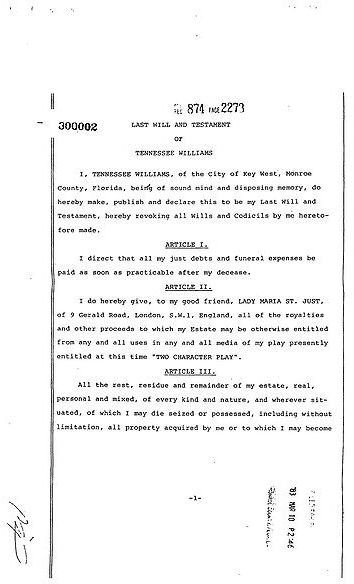Legal Management of Elderly Parent's Finances: Tips on How to Do It
Why Elderly Finances Are Important
When a parent reaches the golden years, disabilities and illnesses often leave them unable to understand or deal with their finances. In addition, while it is unfortunate, many people and companies look to scam the elderly out of money and even their homes.
Consider the guidance your parents gave to you during your formative years along with money they invested for you for college, that first car, and other important aspects in your life where they played in important role.
Now it is time for you to return the favor, especially if a parent becomes incapacitated and is unable to handle their finances.
Image Credit: GravelCouple Wikimedia Commons
Where to Start
If possible, it is best to speak with your parents while they are still able to understand finances and express their opinions clearly on what they wish for the future. Sometimes, life does not allow for this, however. If you do have time to create a financial plan, do so and remember to obtain a legal power of attorney if one or both of your parents is unable to make financial decisions on their own.
A legal power of attorney should be all-inclusive when it comes to legal management of elderly parent’s finances. This will ensure that you can prevent scams, enlist the aid of financial help or health services on their behalf, and make sure they do not overspend, and live within their means. This will also give you the right to handle investments, bank accounts, and make financial decisions. A all-inclusive power of attorney will enable you to obtain financial information and make legal decisions as well as becoming a signer or advisor on bank and investment accounts.
If you are unsure on how to write a power of attorney, consult a legal consultant or find a power of attorney online.
Gather Information

Whether you are working with your elderly parents or on your own, the important information you should gather includes:
- All insurance polices including health, disability, and policies related to short or long term care.
- Social security numbers and dates of birth
- Important cards such as Medicaid
- A good list of medical needs including health conditions and both prescribed and over the counter medications utilized.
- Copies of loans and mortgages
- Copies of investment papers including real estate, retirement plans, dividends, stocks, bonds, and any other financial information related to investments such as titles to owned vehicles.
- Bank accounts
- Income sources and amounts
- Monthly living expense requirements as well as annual items such as property taxes or association fees.
- Tax returns, safe deposit boxes and keys, keys to vehicles and homes.
- A list of all pertinent doctors, lawyers, and insurance brokers.
- Pet information, especially vet information as well as your parent’s desires upon an illness or death of a loved pet.
- Funeral and burial wishes including burial plots.
- Copies of wills and living wills.
Image Credit: Tennessee William Will Wikimedia Commons
Be a Guide

Too often, children of elderly parents forget how important it is to be a guide more than a dictator when it comes to legal management of elderly parent’s finances. Even if a parent suffers from Alzheimer’s or dementia, think of yourself as a guide to helping them in their final years.
Take treks with them and meet lawyers, bankers, insurance agents, and physicians so they all know exactly when you will be legally handling your parent’s finances. Try not to take away important papers; instead make copies and leave them with your parents while you keep the originals. Make duplicates of keys where possible.
Help analyze their monthly living expenses including mortgage payments, rents, food, utilities, medication and medical expenses as well as vehicle expenses. Use free software you can find on the Internet that helps track expenses; after all, you have your own expenses to consider. Utilizing software or an spreadsheet will ensure you don’t miss important payments or appointments.
Image Credit: Nurse in Geriatry Wikimedia Commons
Talk and Listen
Do offer sound advice on what your parents can and can’t afford, but try and listen to their wants and needs. Consider how you would like to be treated and use those ideas when practicing legal management of elderly parent’s finances.
Check with them regularly if they do not reside with you and inquire about things like overspending. Keep in mind that you are their guide, not their keeper, so use common sense and treat your parents with the respect they deserve.
Enlisting Help
If your parents have numerous investments, income, real estate, and retirement plans, consider enlisting the help of a financial planner who can legally help you not only manage your parent’s money but help both you and your parents make sound decisions on monthly expenses.
Find local senior centers that offer elderly scam tip classes so your elderly parents can be aware of current scams. If your parents have weekly outings with other seniors make sure you arrange safe transportation or drive them on your own.
If one or both of your parents requires retirement or nursing home care, make sure you find out if any of their short or long term insurance policies will cover the cost and visit retirement centers to help you define what is and what is not covered.
Legal management of elderly parent’s finances does not have to be a chore unless you make it a chore. Discuss what they want, offer tips on what they can afford, help them make wise financial decisions, and work with friends and relatives on a buddy system in case you are not available.
Finally, to ensure you have all the legal rights you need when it comes to managing your parent’s finances, obtain a power of attorney and discuss with your parents how the power attorney will affect their lives if they do become unable to care for themselves or their finances.
